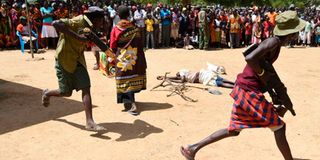Restore reservists in the arid north to fight cattle rustling

Youths enact the dangers of cattle rustling during a peace meeting at Kainuk in Turkana County on January 21, 2018.
What you need to know:
- Since independence, Northern Kenya has borne the brunt of cattle rustling, banditry and land clashes.
- This partly prompted the recruitment and deployment of National Police Reservists (NPRs), previously called KPRs (Kenya Police Reservists).
Counties occupied by pastoralists face challenges of low state penetration, small arms and decades of inter-communal conflicts. The arid region is characterised by high levels of insecurity and under-development.
Since independence, Northern Kenya has borne the brunt of cattle rustling, banditry and land clashes.
This partly prompted the recruitment and deployment of National Police Reservists (NPRs), previously called KPRs (Kenya Police Reservists). This is an ancillary force armed by the state to provide security services in areas where police presence is inadequate like Turkana, Samburu, Marsabit, Isiolo, Laikipia and West Pokot.
The Kenya Police Act provides that “the reserve may be employed for assisting the force in maintenance of law and order, the preservation of peace, the protection of life and property, the prevention and detection of crime, the apprehension of offenders, and the enforcement of all laws and regulations with which the force is charged”.
In May 2019, the Ministry of Interior withdrew guns from reservists in pastoralist counties, alleging that the units “were misusing their weapons to attack residents”. Sadly, what’s being overlooked is the crucial role reservists play in curbing violence in the arid north. For years, they have been of great benefit to the police.
They protect local communities against internal and cross-border attacks since they are within reach, respond quickly and are familiar with the terrain.
They’ve also dealt with the cattle-rustling menace at no cost to the exchequer since they are strategically positioned to implement the community policing programme as they enjoy good relations with the locals.
Since their withdrawal three years ago, a wave of insecurity has swept Baragoi in Samburu North, Turkana, Baringo and West Pokot due to competition for resources and infiltration of small arms.
Economic marginalisation
Easy access to illegal guns has resulted in a spike in banditry and cattle rustling. This has been fuelled by political and economic marginalisation of pastoral groups, and inadequate land and resource management policies. Most of the guns are cheap, need minimal maintenance and require little training to use. This means that even the youngest herdsboy can assume the status of a warrior and join the ever-growing militias.
Conflict has resulted in many deaths, injuries and displacements of thousands of families in places like Baragoi, Lesirikan, Uaso Rongai, Nachola and Kapedo.
In recent years, disarmament operations have failed. In the absence of reliable services of NPR, warriors took it upon themselves to acquire arms to protect their communities. Under the prevailing situation, the easiest way of ending insecurity is by deploying reservists.
Recruitment of reservists should incorporate their characteristics, such as age, gender, marital status, education level and economic status. This will ensure an effective workforce by selecting young, energetic, literate and responsible people while considering gender balance. They should also be economically empowered to avoid compromising their integrity.
Strategies should be put in place to ensure their operations are above board. Address critical issues such their remuneration, training, medical cover and compensation for injury and deaths that may occur while on duty.
There is a need to establish a reservists’ training centre and develop a curriculum covering areas such as community policing, human rights, peace building and intelligence gathering. Their operational capacity should improve through regular supply of uniforms, arms and ammunition, first aid kits, food rations, communication gadgets and patrol vehicles.
Security is a key factor in the attainment of Vision 2030 goals, especially the social and economic pillars. Future economic prospects lie mainly in the remote areas after the discovery of oil, gas, coal and other natural resources. However, the rising level of insecurity fueled by the absence of reservists in pastoral areas threatens to slow down growth.





